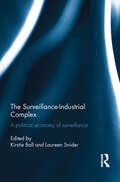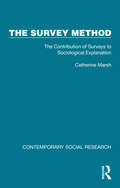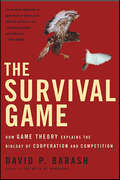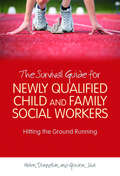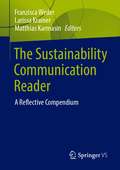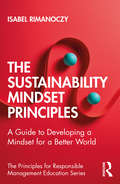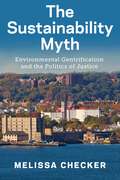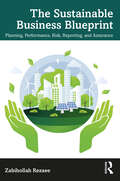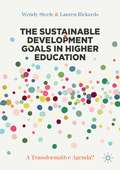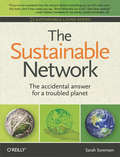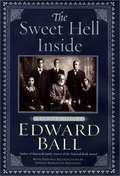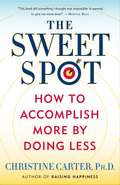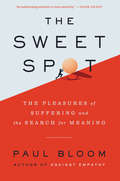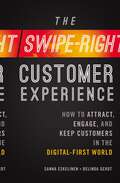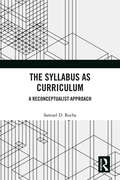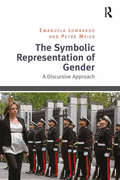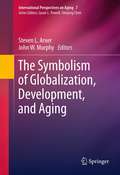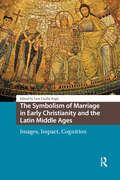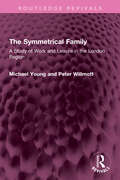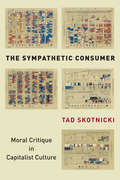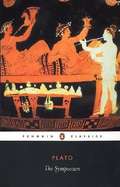- Table View
- List View
The Surveillance-Industrial Complex: A Political Economy of Surveillance
by Kirstie Ball Laureen SniderToday’s ‘surveillance society’ emerged from a complex of military and corporate priorities that were nourished through the active and ‘cold’ wars that marked the twentieth century. Two massive configurations of power – state and corporate – have become the dominant players. Mass targeted surveillance deep within corporate, governmental and social structures is now both normal and legitimate. The Surveillance-Industrial Complex examines the intersections of capital and the neo-liberal state in promoting the emergence and growth of the surveillance society. The chapters in this volume, written by internationally-known surveillance scholars from a number of disciplines, trace the connections between the massive multinational conglomerates that manufacture, distribute and promote technologies of ‘surveillance’, and the institutions of social control and civil society. In three parts, this collection investigates: how the surveillance-industrial complex spans international boundaries through the workings of global capital and its interaction with agencies of the state surveillance as an organizational control process, perpetuating the interests and voices of certain actors and weakening or silencing others how local political economies shape the deployment and distribution of the massive interactions of global capital/military that comprise surveillance systems today. This volume will be useful for students and scholars of sociology, management, business, criminology, geography and international studies.
The Survey Method: The Contribution of Surveys to Sociological Explanation (Contemporary Social Research)
by Catherine MarshIn the early 1980s, the survey was the most widely used method of social research, but it had been the object of much damaging criticism. Critics maintained that there were philosophical flaws inherent in survey practice which made it unacceptable as valid method; sociology students were taught that surveys are ‘positivist’ and that alternatives should be sought wherever possible. In The Survey Method, originally published in 1982, Catherine Marsh examines such claims and shows that much of this criticism was ill-founded.The book shows that surveys do not have to be mere superficial glimpses of the surface features of processes, fact-gathering exercises or opinion polls. Properly designed, executed and analysed, they can actually provide the kind of evidence that social theorists, concerned with uncovering dynamic aspects of social life, will want to use. Catherine Marsh challenges the contention that different research procedures automatically have to commit those who use them either to a particular theory of knowledge, a view of human nature or even a political stance.The Survey Method is neither a pure defence of surveys nor a textbook on how to do them. It does, after all, criticise the kinds of surveys that are often done, and it is particularly hostile to some new and manipulative developments in the often anti-democratic use made of survey results and opinion polls. Catherine Marsh’s aim is to contribute to the methodological debate on survey research. Although the book will find most of its readers among academic sociologists, it also contains a wealth of detail on the history of surveys and an extensive annotated bibliography of the major survey literature. It will accordingly prove essential reading for practising social researchers while re-establishing the credentials of survey research amongst the broader social science community.
The Survival Game: How Game Theory Explains the Biology of Cooperation and Competition
by David P. Barash“An accessible, intriguing explanation of game theory . . . can help explain much human behavior.” —Seattle Post-IntelligencerHumans, like bacteria, woodchucks, chimpanzees, and other animals, compete or cooperate in order to get food, shelter, territory, and other resources to survive. But how do they decide whether to muscle out or team up with the competition?In The Survival Game, psychology professor David P. Barash synthesizes the newest ideas from psychology, economics, and biology to explore and explain the roots of human strategy. Drawing on game theory—the study of how individuals make decisions—he explores the give-and-take of spouses in determining an evening's plans, the behavior of investors in a market bubble, and the maneuvers of generals on a battlefield alongside the mating and fighting strategies of “less rational” animals. Ultimately, Barash's lively and clear examples shed light on what makes our decisions human, and what we can glean from game theory and the natural world as we negotiate and compete every day.“Draws out the implications of game theory for matters great and small, and does so in a thoroughly accessible and inviting way.” —New York Times–bestselling author Steven Pinker“Barash combines game theory with evolutionary biology, arguing that the strategic choices people make as they go through life [are] encoded in their brains by millions of years of evolution . . . His examples—including farm economics, jungle mating strategies and World War II battlefields—are convincing.” —Washington Post
The Survival Guide for Newly Qualified Child and Family Social Workers
by Helen Donnellan Gordon Jackxx
The Sustainability Communication Reader: A Reflective Compendium
by Larissa Krainer Matthias Karmasin Franzisca WederThe Textbook seeks for an innovative approach to Sustainability Communication as transdisciplinary area of research. Following the United Nations Sustainable Development Goals, which are intended to transform the world as it is known, we seek for a multidisciplinary discussion of the role communication plays in realizing these goals. With complementing theoretical approaches and concepts, the book offers various perspectives on communication practices and strategies on an individual, organizational, institutional, as well as public level that contribute, enable (or hinder) sustainable development. Presented case studies show methodological as well as issue specific challenges in sustainability communication. Therefore, the book introduces and promotes innovative methods for this specific area of research.
The Sustainability Mindset Principles: A Guide to Developing a Mindset for a Better World (The Principles for Responsible Management Education Series)
by Isabel RimanoczyAs we increase our awareness of the planetary challenges and how they intersect with the discipline or profession we choose to focus on, we have put our attention on the external forces and impacts. What remains untouched however is the set of beliefs, values, assumptions, mental processes, and paradigms that we hold and share: our mindset. But how do we change a mindset? This book is the first to introduce the 12 Principles for a Sustainability Mindset, presenting educators with a framework that makes it easy to include them into teaching plans and lessons of any discipline. Written in a very clear and practical way, the book provides examples, checklists, tips, and tools for professionals and educators. It transforms the development of a much-needed mindset for sustainability into an accessible, fun and intuitive task. The book is written with educators from a variety of disciplines in mind, including but not limited to management educators, coaches, and trainers. No other book comes close to providing such a well-organized and solid way of starting to shift our mindsets in the direction of sustainability.
The Sustainability Myth: Environmental Gentrification and the Politics of Justice (New Directions In Sustainability And Society Ser.)
by Melissa CheckerWINNER OF THE 2021 DELMOS JONES AND JAGNA SHARFF MEMORIAL PRIZE FOR THE CRITICAL STUDY OF NORTH AMERICA!Uncovers the hidden costs and contradictions of sustainable policies in an era driven by real estate developmentFrom state-of-the-art parks to rooftop gardens, efforts to transform New York City’s unsightly industrial waterfronts into green, urban oases have received much public attention. In The Sustainability Myth, Melissa Checker uncovers the hidden costs—and contradictions—of the city’s ambitious sustainability agenda in light of its equally ambitious redevelopment imperatives.Focusing on industrial waterfronts and historically underserved places like Harlem and Staten Island’s North Shore, Checker takes an in-depth look at the dynamics of environmental gentrification, documenting the symbiosis between eco-friendly initiatives and high-end redevelopment and its impact on out-of-the-way, non-gentrifying neighborhoods. At the same time, she highlights the valiant efforts of local environmental justice activists who work across racial, economic, and political divides to challenge sustainability’s false promises and create truly viable communities.The Sustainability Myth is a cautionary, eye-opening tale, taking a hard—but ultimately hopeful—look at environmental justice activism and the politics of sustainability.
The Sustainability and Spread of Organizational Change: Modernizing Healthcare (Routledge Studies in Organizational Change & Development)
by David A. Buchanan Louise Fitzgerald Diane KetleyThis important book examines issues affecting the sustainability and spread of new working practices. The question of why good ideas do not spread, ‘the best practices puzzle’, has been widely recognized. But the ‘improvement evaporation effect’, where successful changes are discontinued, has attracted less attention. Keeping things the way they are has been seen as an organizational problem to be resolved, not a condition to be achieved. This is one of the first major studies of the sustainability of change focusing on the example of the NHS, by a unique team of health service and academic researchers. The findings may apply to a variety of other settings. The agenda set out in 2000 in The NHS Plan is perhaps the largest organization development programme ever undertaken, in any sector, anywhere. The NHS thus offers a valuable ‘living laboratory’ for the study of change. This text shows that sustainability and spread are influenced by a range of issues - contextual, managerial, political, individual, and temporal. Developing a processual perspective, this fresh analysis considers policy implications, and strategies for managing sustainability and spread. This book will be essential reading for students, managers, and researchers concerned with the effective implementation of organizational change.
The Sustainable Business Blueprint: Planning, Performance, Risk, Reporting, and Assurance
by Zabihollah RezaeeUnderstanding how to build and manage a sustainability business plan has become a business imperative as investors demand, regulators require, and stakeholders increasingly expect companies to report their financial economic sustainability performance (ESP) and non-financial environmental, social, and governance (ESG) sustainability information. This book provides both the rationale for and key practical steps in how to approach business sustainability factors of planning, performance, risk, reporting, and assurance.This comprehensive book covers all the areas that a business would need to embed, articulate, and execute a strategy of profit-with-purpose in promoting shared value creation for all stakeholders. It addresses drivers, sources, and international guidelines (GRI, IIRC, SASB, FASB, PCAOB, IAASB, ISSB) for prioritising business sustainability factors, and establishing the link between ESG performance and financial performance. It presents key performance indicators (KPIs) of ESP and ESG dimensions of sustainability performance. It also provides templates for performance, risk, and disclosure; presenting cases and examples of why to disclose ESG performance, what to disclose, and where and how to disclose ESG performance information.For businesses wanting a detailed understanding of how to deliver on these important areas, including boards of directors, senior management, financial officers, internal auditors, external auditors, legal counsel, investors, and regulators, this book is an invaluable resource.
The Sustainable Development Goals in Higher Education: A Transformative Agenda?
by Wendy Steele Lauren RickardsThis book explores the role universities have to play in fulfilling the Sustainable Development Goals (SDGs). At the heart of “sustainable development” is the legacy of unsustainable development with its roots in modernity and colonialism. Critical engagement with the SDGs involves recognising these roots are shared by universities and the reciprocal need for maintenance, repair and regeneration. Universities are not just enablers of change, but also important targets of change. By focusing on the role of education about, for and through the SDGs, the authors seek to advance critical engagement with higher education that is both progressive and meaningful. We are all responsible for bearing witness to our age. This book will appeal to all those who hope that more sustainable future worlds are still possible.
The Sustainable Network: The Accidental Answer for a Troubled Planet
by Sarah Sorensen"Companies with a stake in the technology industry or that have staked on the Internet (ala Google or Amazon or any of the thousands of small ecommerce companies around the world) are likely to pluck multiple nuggets of wisdom from her book."-- Heather Clancy, business journalistWhat technologies do we need to solve the complex environmental, economic, social, and political challenges facing us today? As this thought-provoking book reveals, one tool for enacting change is already at our fingertips: the global network.Consider the private domains of companies, governments, and institutions along with the public Internet: we have an immense communications network that connects billions of people in ways we never thought possible. In this book, author Sarah Sorensen clearly demonstrates why this network is the best sustainable technology available to help us tackle a wide range of problems.If each of us represents a node on this network, then it's time we realize the potential we hold. The Sustainable Network is a call to action, urging individuals, governments, markets, and organizations to put the power of this network to good use.Discover how the sustainable network connects us all, with examples of how it's already effecting changeUnderstand how this network magnifies the impact of even the smallest change and newest ideaExplore the role that various market and political forces playLearn how the network can be improved to better address environmental, economic, and social conditionsGet practical advice that you or your business can follow now
The Sweet Hell Inside: A Family History
by Edward BallWith the panoramic story of one "colored elite" family who rises from the ashes of the Civil War to create an American cultural dynasty Edward Ball offers the historical and, literary successor to his highly acclaimed Slaves in the Family, a New York Times bestseller and winner of the 1998 National Book Award.<P> The Sweet Hell Inside recounts the lives of the Harleston family of South Carolina, the progeny of a Southern gentleman and his slave who cast off their blemished roots and achieved affluence in part through a surprisingly successful funeral parlor business. Their wealth afforded the Harlestons the comfort of chauffeurs, tailored clothes, and servants whose skin was darker than theirs. It also launched the family into a generation of glory as painters, performers, and photographers in the "high yellow" society of America's colored upper class. The Harlestons' remarkable one-hundred-year journey spans the waning days of Reconstruction, the precious art world of the early 1900s, the back alleys of the Jazz Age, and the dawn of the civil rights movement.<P> Enhanced by the recollections of the family's archivist, eighty-four-year-old Edwina Harleston Whitlock -- whose bloodline the author sharesThe Sweet Hell Inside features a portrait artist whose subjects included industrialist Pierre Du Pont; a black classical composer in the Lost Generation of 1920s Paris; an orphanage founder who created a famous brass band from the ranks of his abandoned waifs, a number of whom went on to burgeoning careers in jazz; and a Harleston mistress who doubled as an abortionist.<P> With evocative and engrossing storytelling, Edward Ball introduces a cast of historical characters rarely seen before: cultured, vain, imperfect, rich, and black, a family made up of eccentrics who defied social convention yet whose advantages could not protect them from segregation's locked doors, a plague of early death, and the stigma of children born outside marriage.<P> The Sweet Hell Inside raises the curtain on a unique family drama in the pageant of American life and uncovers a fascinating lost world.
The Sweet Spot
by Christine CarterLearn how to achieve more by doing less! Live in that zone you've glimpsed but can't seem to hold on to--the sweet spot where you have the greatest strength, but also the greatest ease. Not long ago, Christine Carter, a happiness expert at UC Berkeley's Greater Good Science Center and a speaker, writer, and mother, found herself exasperated by the busyness of modern life: too many conflicting obligations and not enough time, energy, or patience to get everything done. She tried all the standard techniques--prioritizing, multitasking, delegating, even napping--but none really worked. Determined to create a less stressful life for herself--without giving up her hard-won career success or happiness at home--she road-tested every research-based tactic that promised to bring more ease into her life. Drawing on her vast knowledge of the latest research related to happiness, productivity, and elite performance, she followed every strategy that promised to give her more energy--or that could make her more efficient, creative, or intelligent. Her trials and errors are our reward. In The Sweet Spot, Carter shares the combination of practices that transformed her life from overwhelmed and exhausting to joyful, relaxed, and productive. From instituting daily micro-habits that save time to bigger picture shifts that convert stress into productive and creative energy, The Sweet Spot shows us how to * say "no" strategically and when to say "yes" with abandon * make decisions about routine things once to free our minds to focus on higher priorities * stop multitasking and gain efficiency * "take recess" in sync with the brain's need for rest * use technology in ways that bolster, instead of sap, energy * increase your ratio of positive to negative emotions Complete with practical "easiest thing" tips for instant relief as well as stories from Carter's own experience of putting The Sweet Spot into action, this timely and inspiring book will inoculate you against "The Overwhelm," letting you in on the possibilities for joy and freedom that come when you stop trying to do everything right--and start doing the right things. Advance praise for The Sweet Spot "Illuminates the simple and sustainable path toward a precious and happy balance."--Deepak Chopra "A gift, like a good friend drawing a personal road map out of the crazy busy swirl of our overloaded lives."--Brigid Schulte, author of Overwhelmed "This book did something I thought was impossible: It seemed to give me more time."--Martha Beck, author of Finding Your Way in a Wild New World "A page-turning thriller full of proven ways to have the life you want."--Rick Hanson, Ph.D., author of Hardwiring Happiness "Timely, lively, and vital, The Sweet Spot is an immediately useful must-read."--Shawn Achor, author of The Happiness Advantage"The Sweet Spot inspired me to make immediate changes that have increased my productivity and lowered my stress."--Dan Mulhern, president, Granholm Mulhern Associates "A must-read for every overworked executive, overwrought parent, or overscheduled human being."--Jennifer Granholm, governor of Michigan, 2003-11From the Hardcover edition.
The Sweet Spot: The Pleasures of Suffering and the Search for Meaning
by Paul Bloom“This book will challenge you to rethink your vision of a good life. With sharp insights and lucid prose, Paul Bloom makes a captivating case that pain and suffering are essential to happiness. It’s an exhilarating antidote to toxic positivity.” —Adam Grant, #1 New York Times bestselling author of Think Again and host of the TED podcast WorkLifeFrom the author of Against Empathy comes a different kind of happiness book, one that shows us how suffering is an essential source of both pleasure and meaning in our livesWhy do we so often seek out physical pain and emotional turmoil? We go to movies that make us cry, or scream, or gag. We poke at sores, eat spicy foods, immerse ourselves in hot baths, run marathons. Some of us even seek out pain and humiliation in sexual role-play. Where do these seemingly perverse appetites come from?Drawing on groundbreaking findings from psychology and brain science, The Sweet Spot shows how the right kind of suffering sets the stage for enhanced pleasure. Pain can distract us from our anxieties and help us transcend the self. Choosing to suffer can serve social goals; it can display how tough we are or, conversely, can function as a cry for help. Feelings of fear and sadness are part of the pleasure of immersing ourselves in play and fantasy and can provide certain moral satisfactions. And effort, struggle, and difficulty can, in the right contexts, lead to the joys of mastery and flow.But suffering plays a deeper role as well. We are not natural hedonists—a good life involves more than pleasure. People seek lives of meaning and significance; we aspire to rich relationships and satisfying pursuits, and this requires some amount of struggle, anxiety, and loss. Brilliantly argued, witty, and humane, Paul Bloom shows how a life without chosen suffering would be empty—and worse than that, boring.
The Swindle of Innovative Educational Finance (Forerunners: Ideas First)
by Kenneth J. SaltmanHow &“innovative&” finance schemes skim public wealth while hijacking public governanceCharter school expansion. Vouchers. Scholarship tax credit programs. The Swindle of Innovative Educational Finance offers a new social theory to explain why these and other privatization policies and programs win support despite being unsupported by empirical evidence. Kenneth J. Saltman details how, under the guise of innovation, cost savings, and corporate social responsibility, new and massive neoliberal educational privatization schemes have been widely adopted in the United States. From a trillion-dollar charter school bubble to the Chan Zuckerberg Initiative to celebrities branding private schools, Saltman ultimately connects such schemes to the country&’s current crisis of truth and offers advice for resistance. Forerunners is a thought-in-process series of breakthrough digital works. Written between fresh ideas and finished books, Forerunners draws on scholarly work initiated in notable blogs, social media, conference plenaries, journal articles, and the synergy of academic exchange. This is gray literature publishing: where intense thinking, change, and speculation take place in scholarship.
The Swipe-Right Customer Experience: How to Attract, Engage, and Keep Customers in the Digital-First World
by Sanna Eskelinen Belinda GerdtThe global COVID-19 pandemic forced everybody to rethink how they operate and the role that digital plays in business and in our lives. While digital may have been top of mind for many businesses, the pandemic made it essential, not just to interact and sell products and services, but as a way to meet the critical needs of your business.More than ever, people are looking for experiences, not products. And not just any experiences—but real ones that turn transactions into engagement and materialism into experimentalism. The pandemic has changed our view of the world, shifted us away from consumerism, and made us appreciate the basic human needs of finding balance and focus. In this new era, customer experience is not just a digital experience, but a perfect combination of real life and digital interaction. It could be a meditative museum experience combining art with augmented reality, or an entertaining shopping experience at a mall with omnichannel support in a virtual fitting room.The Swipe-Right Customer Experience shows how the best companies have transformed the customer experience beyond offering a technology add-on and built or rebuilt their infrastructure, processes, talent and culture around the customer experience. You will learn:How the world has changed since the global pandemic, the role of digitization, and why customer experience means everything.The secret to how top-performing companies in five different industries have rebuilt themselves around the experience they offer to customers.The internal components of organizations that must be transformed: culture, skills, processes and workflow, brand, and measuring.The new technology trends that are driving next-level customer experience.
The Syllabus as Curriculum: A Reconceptualist Approach (Routledge Research in Education)
by Samuel D. RochaCan the syllabus constitute the curriculum? In this volume, Rocha explores curriculum theory through the lens of the syllabus. By critiquing curriculum studies and the entire field of education, overrun by the social sciences, Rocha provides an integrated vision of philosophy of education and curriculum theory, rooted in the humanities. Through an original reconceptualization, this text draws from a broad range of sources – ranging from Classical Antiquity to the present – offering a rich context for understanding curriculum as a philosophically salient concept, contained within the syllabus. The Syllabus as Curriculum features actual syllabi created and taught by the author in undergraduate and graduate courses at the University of British Columbia, Canada. These curated syllabi work as exemplars and media, supported by pedagogical commentary and context. Inspired by Augustine’s Confessions, each part of the book culminates in a metaphorical "garden," which serves as a meditation on the syllabus in three senses: correspondence, essay, and outline. An original, powerful, and corrective contribution to the literature on curriculum studies, this work invites teachers and scholars from across the foundations of education, especially philosophy of education, art education, and those invested in curriculum theory, to see their contribution in more direct and integral ways.
The Symbolic Representation of Gender: A Discursive Approach
by Emanuela Lombardo Petra MeierWhat is symbolic representation? Since Hanna Pitkin’s seminal The Concept of Representation, the symbolic has been the least studied dimension of political representation. Innovatively adopting a discursive approach, this book - the first full-length treatment of symbolic representation - focuses on gender issues to tackle important questions such as: What are women and men symbols of, and how is gender constructed in policy discourse? It studies what functions symbolic representation fulfils in the construction of gender, what social roles get legitimized in policy discourse, and how this affects power constellations, ultimately revealing much about the relation between symbolic, descriptive, and substantive representation. Emanuela Lombardo and Petra Meier draw on theories of symbolic representation and gender, as well as rich primary material about political debates on labour and care issues, partnership and reproductive rights, gender violence, and quotas. Using this original data, the authors show that reconsidering symbolic representation from a discursive perspective makes explicit issues of (in)equality embedded within particular constructions, as well as their consequences for political representation and gender equality. This important exploration raises relevant new questions regarding the representation of gender that form valuable contributions to the fields of political science, political theory, sociology, and gender studies.
The Symbolic Universes of Art in Society: Representations and Transitions (Culture in Policy Making: The Symbolic Universes of Social Action)
by Katrin Kullasepp Marc Antoine Campill Lia LordeloThis volume explores the dynamic dialogue of art within society from a multitude of perspectives across the world. It highlights art as a process that is interwoven with notions of physical and metaphysical transition and represents a fundamental awareness of how art is represented and shaped through everyday social challenges. The chapters in this volume link the idea of symbolic universes with social practices of art in different societies and through different historical epochs, under the assumption that art leads the development of cultural systems underlying society. The volume looks at art that is shaped by forgotten or/and hidden perspectives. It suggests that art may have crucial, phenomenologically approachable variations that have been misunderstood in the scientific fields. The work considers art and science as complementary, instead of as counterparts/opposing forces. Divided into an introductory and four thematic parts, the volume reflects on historical signs preserved in artwork; explores the meaning behind art and the experience of cultural cultivation; delves into the dynamic shaping of creative expression through art; and, finally, looks at the artists’ own experiences of performance. This volume is of interest to researchers and students in the fields of cultural psychology, semiotics, arts and aesthetics, and cultural studies.
The Symbolism of Globalization, Development, and Aging
by John W. Murphy Steven L. ArxerThis book looks at the symbolic side of globalization, development, and aging. Many of the dimensions that are discussed represent updates of past debates but some are entirely new. In particular, globalization is accompanied by subtle social imagery that profoundly shapes the way institutions and identities are imagined. The process of aging and persons sense of identity is no exception. The underlying assumptions that pervade globalization inform how critical dimensions of aging are discussed and institutionalized. The application of marketplace imagery, for example, may impact attempts for holism in how aging is studied and the prospects for human agency during the aging process. This book offers a special look into how temporality, technology, normativity, and empiricism structure the symbolic side of globalization and influence dominant images of the aging process. Current debates about globalization and aging are expanded by helping readers see the social imagery that is both subtly behind globalization and at the forefront of shaping the aging experience.
The Symbolism of Marriage in Early Christianity and the Latin Middle Ages: Images, Impact, Cognition (Knowledge Communities)
by Line Cecilie EnghIn the Middle Ages everyone, it seems, entered into some form of marriage. Nuns - and even some monks - married the bridegroom Christ. Bishops married their sees. The popes, as vicars of Christ, married the universal Church. And lay people, high and low, married each other. What united these marriages was their common reference to the union of Christ and Church. Christ's marriage to the Church was the paradigmatic symbol in which all the other forms of union participated, in superior or inferior ways. This book grapples with questions of the impact of marriage symbolism on both ideas and practice in the early Christian and medieval period. In what ways did marriage symbolism - with its embedded concepts of gender, reproduction, household, and hierarchy - shape people's thought about other things, such as celibacy, ecclesial and political relations, and devotional relations? How did symbolic cognition shape marriage itself? And how, if at all, were these two directions of thinking symbolically about marriage related?|multidiciplinary approach, high-precision conceptual analyses, a case study of symbolical cognition
The Symmetrical Family: A Study of Work and Leisure in the London Region (Routledge Revivals)
by Michael Young Peter WillmottFirst published in 1973, The Symmetrical Family combines evidence about the family of the past with information from a sociological survey in the London region and uses both as the basis for a speculative discussion about the future. The argument is that a new style of family life has emerged. Its basis is not equality between husbands and wives but at least something approaching symmetry: increasingly wives work outside the home and husbands inside it. The new family is itself under increasing pressure. Contrary to the popular view, there is yet no sign of a general increase in leisure. In some occupations work is dominant and becoming more so; at the same time the proportions of people in such jobs, though still in the minority, are expanding. The growing demand of wives for paid work outside the home means that in place of two jobs, one for the husband and one for the wife, there will often be four, with both working inside as well as outside the home. How long will people be able to bear the consequent strain? In a final chapter the authors discuss what they think will happen unless people decide quite deliberately, to reduce the pressure upon themselves and their children. This book will be of interest to students of sociology, health, social care, anthropology and public policy.
The Sympathetic Consumer: Moral Critique in Capitalist Culture (Culture and Economic Life)
by Tad SkotnickiWhen people encounter consumer goods—sugar, clothes, phones—they find little to no information about their origins. The goods will thus remain anonymous, and the labor that went into making them, the supply chain through which they traveled, will remain obscured. In this book, Tad Skotnicki argues that this encounter is an endemic feature of capitalist societies, and one with which consumers have struggled for centuries in the form of activist movements constructed around what he calls The Sympathetic Consumer. This book documents the uncanny similarities shared by such movements over the course of three centuries: the transatlantic abolitionist movement, US and English consumer movements around the turn of the twentieth century, and contemporary Fair Trade activism. Offering a comparative historical study of consumer activism the book shows, in vivid detail, how activists wrestled with the broader implications of commodity exchange. These activists arrived at a common understanding of the relationship between consumers, producers, and commodities, and concluded that consumers were responsible for sympathizing with invisible laborers. Ultimately, Skotnicki provides a framework to identify a capitalist culture by examining how people interpret everyday phenomena essential to it.
The Symposium
by Plato Christopher GillIn the course of a lively drinking party, a group of Athenian intellectuals exchange views on eros, or desire. From their conversation emerges a series of subtle reflections on gender roles, sex in society and the sublimation of basic human instincts. The discussion culminates in a radical challenge to conventional views by Plato's mentor, Socrates, who advocates transcendence through spiritual love. <p><p> This book is a deft interweaving of different viewpoints and ideas about the nature of love - as a response to beauty, a cosmic force, a motive for social action and as a means of ethical education. Christopher Gill's translation retains all the drama and humour of the Greek, bringing the historical figures to life. His introduction discusses aspects of classical Athenian life shown in the book and provides thoughtful examinations of the individual speeches.
The Synagogue in America: A Short History
by Marc Lee Raphael&“An insightful, scholarly, and comprehensive overview of the evolution and changing role of the American synagogue" (Choice). In 1789, when George Washington was elected the first president of the United States, laymen from all six of the new nation&’s Jewish congregations sent him congratulatory letters. He replied to all six—thus recognizing these religious institutions as part of the new nation. By this time, the synagogue had become the focal point of American Jewish life, a dominance that was not challenged until the twentieth century, when institutions such as Jewish community centers or Jewish philanthropic organizations claimed to be the hearts of their Jewish communities. Concise yet comprehensive, The Synagogue in America is the first history of this all-important institution, illuminating its changing role within the American Jewish community over the course of three centuries. From Atlanta and Des Moines to Los Angeles and New Orleans, Marc Lee Raphael examines Orthodox, Reform, Conservative, and Reconstructionist synagogues. He traces the emergence of the American synagogue from the colonial period to its modern proliferation and diversification. Encompassing architecture, forms of worship, rabbinic life, fundraising, creative liturgies, and feminism, The Synagogue in America is the go-to history for understanding the synagogue&’s significance in American Jewish life.
